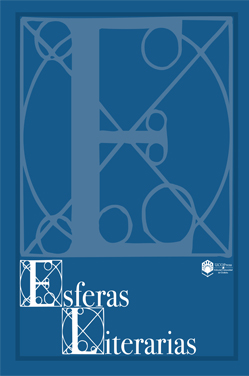Un diálogo entre «Clueless» (1995) y «Emma.» (2020): la heroína posfeminista y feminista de la cuarta ola en las adaptaciones de Austen
Contenido principal del artículo
Resumen
Este artículo explora la influencia de la novela Emma de Jane Austen (1815) y su adaptabilidad a contextos contemporáneos, examinando la adaptación de Cher en Clueless (dir. Heckerling, 1995) y Emma en Emma. (dir. de Wilde, 2020). Cher personifica la arquetípica heroína posfeminista de los años 90, con sus contradicciones inherentes y la perpetuación de ciertos discursos problemáticos. Por el contrario, a pesar de estar ambientada en la época de la Regencia, la Emma más reciente presenta un personaje más humanizado con una actitud feminista más acorde con los ideales del feminismo de la cuarta ola.
Descargas
Detalles del artículo

Esta obra está bajo una licencia internacional Creative Commons Atribución-NoComercial-SinDerivadas 4.0.
Citas
Aragay, Mireia (2005), Books in Motion: Adaptation, Intertextuality, Authorship, New York, Rodopi. DOI: https://doi.org/10.1163/9789401202756
Austen, Jane (1815), Emma, London, Penguin Classics. DOI: https://doi.org/10.1093/oseo/instance.00080853
Austen-Leigh, James E. (2002 [1871]). A Memoir of Jane Austen and Other Family Recollections, ed. Kathryn Sutherland, New York, Oxford World’s Classics.
Bruner, Raisa (2020), «How the New Emma Movie Updates the Relationship at Its Core», TIME, <https://time.com/5788138/emma-movie-vs-book/>.
Carr, Flora (2020), «Emma. director reveals why she added THAT nosebleed scene», RadioTimes, February 2020, <https://www.radiotimes.com/movies/emma-film-nosebleed/>.
Cracknell, Carrie (2020), Persuasion. Written by/Screenplay by Ronald Bass, Netflix, <https://www.netflix.com/search?q=persuasion&jbv=81410649109>, 109 minutes.
Dashwood, Rita J. and Andrew McInnes (2023), «Sadist, Land Shark, and Reptile: Autumn de Wilde’s EMMA.», The Journal of Popular Culture 56, no. 1, <https://doi.org/10.1111/jpcu.13194>. DOI: https://doi.org/10.1111/jpcu.13194
Erdal, Guro (2022), «Clueless about Class: A Study of how Four Film Adaptations of Jane Austen’s Emma Adapt the Theme of Class», PhD diss., University of Bergen, <https://bora.uib.no/bora-xmlui/bitstream/handle/11250/3000797/Erdal_MA_Thesis.pdf?sequence=1&isAllowed=y>.
Ferriss, Suzanne and Mallory Young (2013), Chick-Lit: The New Woman’s Fiction, New York, Routledge. DOI: https://doi.org/10.4324/9780203036211
Frankel, Valerie E. (2020), Fourth Wave Feminism in Science Fiction and Fantasy: Volume 2. Essays on Television Representations, 2013-2019, North Carolina, McFarland & Company.
Gill, Rosalind (2007), «Postfeminist media culture: Elements of a sensibility», European Journal of Cultural Studies 10, no. 2, pp. 147-166. DOI: https://doi.org/10.1177/1367549407075898
Gillespie, Iseult (2019), «The wicked wit of Jane Austen – Iseult Gillespie», Published March 21, 2019, TED-Ed, YouTube, Video, 5:00, <https://www.youtube.com/watch?v=NSL55lOwznU>.
Glasburgh, Michele M (2006), «Chick-lit: the new face of postfeminist fiction?», PhD diss., University of North Carolina, <https://cdr.lib.unc.edu/concern/masters_papers/hh63t069n>.
Glenister, John (1972), Emma, Screenplay by Denis Constanduros, United Kingdom, BBC, 240 minutes.
Gnedash, Anna A. (2022), «The Fourth Wave of Feminism: Political Discourse and Opinion Leaders in Twitter», RUDN Journal of Political Science 24, no. 1, pp. 64-89. DOI: https://doi.org/10.22363/2313-1438-2022-24-1-64-89
Heckerling, Amy (1995), Clueless, Written by/Screenplay by Amy Heckerling, Netflix, <https://www.netflix.com/title/384406>, 97 minutes.
Karlyn, Kathleen R. (2011), Unruly Girls, Unrepentant Mothers: Redefining Feminism on Screen, Austin, University of Texas Press.
Lawrence, Diarmuid (1996), Emma, Written by Andrew Davies, United Kingdom, United Film and Television, 107 minutes.
Maguire, Sharon (2001), Bridget Jones’s Diary, Written by/Screenplay by Helen Fielding, Andrew Davies and Richard Curtis, United Kingdom, Universal Pictures, 97 minutes.
Mak Yui Yan, Yvonne (2020), «Emma on Film: Feminist Influence in the 2020 Adaptation», PhD diss., The Chinese University of Hong Kong, <https://www.eng.cuhk.edu.hk/files/programmes/ba/4700/Exemplary_Capstone_Projects_2020.pdf#page=306>.
McGrath, Douglas (1996), Emma, Written by/Screenplay by Douglas McGrath, United Kingdom, Buena Vista International, 121 minutes.
McRobbie, Angela (2009), The Aftermath of Feminism: Gender, Culture and Social Change, London, SAGE.
Mulvey, Laura (1999 [1975]) «Visual Pleasure and Narrative Cinema», Film Theory and Criticism: Introductory Readings, ed. Leo Braudy and Marshall Cohen, pp. 833-44, New York, Oxford University Press.
Munro, Ealasaid (2013), «Feminism: A Fourth Wave?», Political Insight, September 2013. DOI: https://doi.org/10.1111/2041-9066.12021
Ojha, Rajshree (2010), Aisha, Screenplay by Devika Bhagat, India, PVR Pictures, 126 minutes.
Parrill, Sue (1999), «Metaphors of Control: Physicality in Emma and Clueless», Persuasions On-line 20, no. 1 (Summer), <http://new.jasna.org/persuasions/on-line/vol20no1/parrill.html>.
Parry, Diana C. et al., (2018), «Fourth wave feminism: Theoretical underpinnings and future directions for leisure research», Feminisms in Leisure Studies: Advancing a fourth wave, ed. Diana C. Parry, pp. 1-12, New York, Routledge, <https://www.researchgate.net/profile/Corey-Johnson-4/publication/350629347_Fourth_wave_feminism/links/61f007b7c5e3103375bd7469/Fourth-wave-feminism.pdf#page=16>. DOI: https://doi.org/10.4324/9781315108476-1
Rhode, Deborah L. (2016), «Appearance as a Feminist Issue», SMU Law Review 69, no. 4, pp. 697-710, <https://scholar.smu.edu/smulr/vol69/iss4/2>.
Silvestre, María, María López, and Raquel Royo (2021), «The Fourth Wave in Audiovisual Content: A True Achievement of Feminism?», International Journal of Communication 15, pp. 416–438, <https://ijoc.org/index.php/ijoc/article/viewFile/14911/3332>.
Tasker, Yvonne, and Diane Negra (2007), Interrogating Postfeminism: Gender and the Politics of Popular Culture, Durham, Duke University Press. DOI: https://doi.org/10.2307/j.ctv1210217
Wilde, Autumn de (2020a), «Director Autumn de Wilde Interview – Emma.», Interview by Stefan Pape, HeyUGuys, YouTube, February 13, 2020, Video, 5:30, <https://www.youtube.com/watch?v=aXjXpckdm9c>.
Wilde, Autumn de (2020b), «Emma. director Autumn de Wilde explains the film’s unusual punctuation», Interview by Flora Carr, RadioTimes, February 14, 2020, Video, 0:27, <https://www.radiotimes.com/movies/emma-title-full-stop-period/>.
Wilde, Autumn de (2020), Emma., Written/Screenplay by Eleanor Catton, Amazon Prime Video, <https://www.primevideo.com/detail/0PHZOUVJIY65GIUS8YMC1CWRON/ref=atv_sr_fle_c_sr316833_1_1_1?jic=8%7CEgNhbGw%3D>, 124 minutes.
Wollstonecraft, Mary (2001 [1792]), A Vindication of the Rights of Woman: with Strictures on Political and Moral Subjects, London, Project Gutenberg. <https://www.gutenberg.org/files/3420/3420.txt>.




